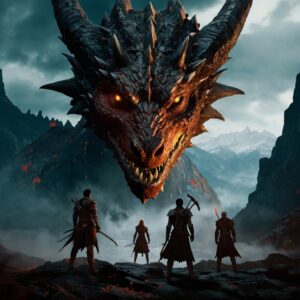Since gamers are accustomed to going deep into storylines and lore, reading can broaden their understanding of the storytelling craft. Books present elaborate histories, layered character motivations, and thematic subtleties that games sometimes allude to but never truly delve into. Reading can enhance focus and imagination, two skills gamers already sharpen while making their way through complex game milieus.
Many popular games have literary roots. Identifying themes or settings in a book that are akin to those in a game can make you love the game all the more. For instance, aficionados of fantasy RPGs might trace some influences of Tolkien’s creations in the very worlds they wander through, just as science fiction readers might spot the shadow of a canonical novel in a space-themed shooter.
Fantasy Books That Speak to RPG Fans
 Games like The Elder Scrolls, Dragon Age, and Dark Souls have created beloved worlds full of magic, legendary creatures, and epic quests. Fans of these immersive universes will find a lot of enjoyment in fantasy novels that enchant and complexify in a similar way.
Games like The Elder Scrolls, Dragon Age, and Dark Souls have created beloved worlds full of magic, legendary creatures, and epic quests. Fans of these immersive universes will find a lot of enjoyment in fantasy novels that enchant and complexify in a similar way.
Begin with “The Name of the Wind” by Patrick Rothfuss. For gamers who really love character-driven stories, this is a great option. It is about Kvothe, a talented young man who goes to a magic school, and the story is part mystery, part adventure, and part tragedy. The feel of exploring a vast RPG world is joined with deep personal history in the narrative, giving it a kind of narrative richness that makes it a rewarding read for any gamer who enjoys lore-heavy titles.
If you like the darker, grueling games like Dark Souls or Bloodborne, then the grim fantasy “Broken Empire” series by Mark Lawrence may be right up your alley. Following Jorg Ancrath, a ruthlessly ambitious anti-hero, the trilogy takes place in a brutal world. The books deal with harsh realities and moral ambiguity, echoing the toughness and complex world-building that fans of challenging games admire.
Then there are canonical works such as J.R.R. Tolkien’s “The Lord of the Rings,” which any lover of fantasy should be well versed in. Many games have borrowed a great deal from the storytelling motifs and mythic themes of Tolkien’s works. By making his trilogy your reading centerpoint, you offer yourself an essential groundwork in high fantasy that can only serve to enrich your understanding of the genre in its applied modern form in video games.
Science Fiction Books for Lovers of Futuristic Games
 For those who spend hours exploring space colonies, futuristic cities, or mech battles, science fiction books offer thrilling narratives grounded in technology, exploration, and speculative futures. Whether you enjoy games like Mass Effect, Halo, or Cyberpunk 2077, there’s a sci-fi book that will speak to your gaming tastes.
For those who spend hours exploring space colonies, futuristic cities, or mech battles, science fiction books offer thrilling narratives grounded in technology, exploration, and speculative futures. Whether you enjoy games like Mass Effect, Halo, or Cyberpunk 2077, there’s a sci-fi book that will speak to your gaming tastes.
“Neuromancer” by William Gibson is a groundbreaking cyberpunk novel that gamers into hacking, neon-lit cityscapes, and virtual realities will adore. This book helped define the cyberpunk genre, painting a gritty future where cybernetics and artificial intelligence blur the lines between man and machine. The fast-paced plot and inventive technological concepts will resonate with players who dive into tech-heavy game worlds.
If you’re drawn to space exploration and grand interstellar politics, check out “The Expanse” series by James S.A. Corey. Beginning with “Leviathan Wakes,” this series combines elements of detective noir and space opera, following intricate characters struggling to endure within a fractured and high-stakes solar system. Fans of games with branching narratives and deep world-building will appreciate how the novels balance thrilling action with thoughtful social commentary.
For a more philosophical take, “Ender’s Game” by Orson Scott Card offers a story about strategy, leadership, and the burden of command. It follows a young genius trained through intense simulations to fight in an alien war. This book echoes the tactical thinking and moral dilemmas gamers often face in strategy games, making it a must-read for anyone who loves the tension of planning and combat.
Dystopian and Post-Apocalyptic Reads for Action-Adventure Fans
Many popular games delve into worlds ripped apart by war, environmental collapse, or totalitarian regimes. If you appreciate titles like Fallout, The Last of Us, or Bioshock, books set in dystopian or post-apocalyptic settings can scratch the same itch.
Consider “The Road” by Cormac McCarthy, an intense and gripping tale that follows a father and son as they journey through a stark, shattered world. While the tone can be heavy, it captures the survival themes many gamers value. The minimalist storytelling provides a focused emotional impact, similar to tense moments in stealth or survival games.
The “Metro 2033” series by Dmitry Glukhovsky explores the perils of surviving in the underground tunnels beneath the ruins of Moscow after an apocalypse. Filled with mutants, political intrigue, and moral questions, the books flesh out the world that inspired the popular video game series. Fans of grueling exploration and tense combat will find familiar territory here.
For dystopian thrills, “1984” by George Orwell remains a powerful pick. Its themes of surveillance, oppression, and rebellion echo games where players fight against corrupt systems or dystopian governments. Though written decades ago, it’s relevance persists, and it offers timeless insights into the dangers of authoritarian control.
 Graphic Novels and Comics That Gamers Can Enjoy
Graphic Novels and Comics That Gamers Can Enjoy
Gamers appreciate visuals alongside storytelling, which is why graphic novels and comics can be a fantastic bridge between gaming and reading. They combine striking artwork with compelling scripts, much like the cinematic experiences games sometimes offer.
One well-loved series is “Saga” by Brian K. Vaughan and Fiona Staples. It blends sci-fi and fantasy, featuring complex characters and stunning visuals. Gamers who enjoy immersive universes with rich character development will appreciate how “Saga” balances emotion, action, and intrigue in every panel.
For fans of superhero games, “Ms. Marvel” by G. Willow Wilson is both fresh and engaging. It introduces a relatable teenage Marvel hero and addresses themes like identity, responsibility, and belonging. Players who enjoy character-driven narratives and vibrant worlds might find this comic a perfect fit.
Another excellent series is “The Witcher” comics, which complement the popular games and novels. They expand on Geralt’s adventures with dark fantasy elements, monsters, and moral complexity. For gamers hooked on the Witcher games, these graphic novels add extra layers of story and artistry.
Tips for Gamers to Get Into Reading
Pick books with game-like elements. Start with stories that resemble your favorite games in tone or theme. This keeps you engaged because the material feels familiar but fresh.
Set small reading goals. Begin by reading for short periods daily. Even 10-15 minutes can build a reading habit. Just like leveling up in a game, consistency pays off.
Use audiobooks. If sitting down with a physical book feels challenging, listening to audiobooks can be a great alternative.
Join book communities linked to gaming. Forums and social media groups often share recommendations for gamer-friendly books. Joining these spaces can motivate you and deepen your appreciation for the stories.
Mix it up with graphic novels. The visual nature of comics and graphic novels might feel closer to gaming’s art style, making it easier to get into narrative reading.